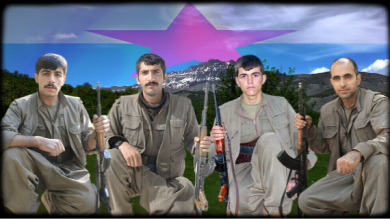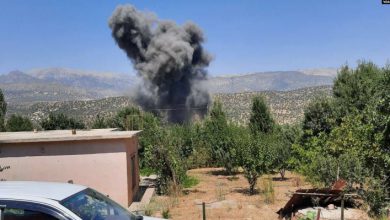The PJAK terrorist group, the Iranian branch of the PKK, rejects dissolution and disarmament
According to Iranian Kurdistan Human Rights Watch, the PJAK terrorist group, the Iranian branch of the PKK, has, in its latest stance following the news of the PKK’s dissolution, declared that it will neither disband nor lay down its arms. However, it supports the call from Abdullah Öcalan, the group’s ideological leader, for a democratic resolution to the Kurdish issue in Turkey and the wider region.
Amir Karimi (Mazdak), co-chairman of PJAK, addressed ambiguities regarding the armed group’s future in an interview with Aryen TV on Monday, May 19th. He stated, “We will neither dissolve ourselves nor lay down our arms. This decision is being announced with complete transparency so that everyone receives a clear answer.” Karimi added that “this position aligns with PJAK’s strategy for a democratic resolution to the Kurdish issue in Iran, but maintaining military capability for the defense of Kurdish rights in Iran is essential.”
It’s worth noting that Abdullah Öcalan, the imprisoned leader of the PKK terrorist group, issued a historic statement on February 27th of this year, urging his supporters to lay down their arms and dissolve the PKK after more than 40 years of conflict with the Turkish government. It should be mentioned that Iranian Kurdistan Human Rights Watch published an article a few days prior, quoting a former PJAK member, who stated, “The announcement of the PKK’s dissolution comes at a time when not only has legal and criminal responsibility for past atrocities not been accepted, but the group’s command and control structure is still active. Key individuals remain at the head of an organization known as ‘KCK’ (Group of Communities in Kurdistan); an organization whose sub-branches, such as PJAK, PYD, SDF, and other cover names, directly receive their orders from it. What will become of the PJAK group? Will it dissolve, or will we hear the sound of the PKK’s disintegration and a rift between its Iranian branch and the top of its hierarchy?”
Thus, with Karimi’s statements, it can now be said that PJAK will not follow the PKK’s orders and will not disarm. Karimi emphasized that PJAK supports Öcalan’s call for a democratic resolution to the Kurdish issue in Turkey, adding, “The process that has begun is positive and effective, and it can remove obstacles to solving the Kurdish issue and strengthen democracy in the region.” However, this senior PJAK member did not explain how an armed approach to Kurdish issues could strengthen democracy in the region, and if an armed approach were effective, why did Öcalan ultimately agree to disarmament?
Another ambiguous point in Karimi’s contradictory remarks is his emphasis on “maintaining military capability for the defense of Kurdish rights in Iran,” even though PJAK is also on Turkey’s list of “terrorist” groups. Given that everyone believes the PKK’s armed approach has never helped resolve the Kurdish issue, it’s unclear how Karimi views military capability. If the PKK disarms, why should its Iranian branch present itself as a defender of Kurdish rights through military means? What has been the real outcome of decades of war that Karimi is now insisting on the necessity of maintaining military capability? What military capability does PJAK actually possess? Are a few hundred unmotivated members, child soldiers, and a few hundred light weapons considered military capability?






